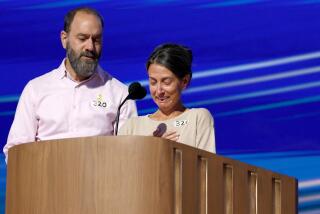Bush Tries to Ease Seniors’ Fears
MONTGOMERY, Ala. — President Bush sought to assure seniors Thursday that their Social Security benefits were safe, part of an effort to stem growing opposition among older Americans to his plans to overhaul the retirement program.
“I don’t care what the TV ads say. I don’t care what the pamphlets say,” Bush said during a visit to Auburn University’s Montgomery campus. “If you are retired or near retirement, the government will pay you what we said we’d pay you.”
In two appearances Thursday, part of a two-day Southern swing designed to soothe seniors’ concerns and build congressional support for his Social Security plans, Bush acknowledged that many of the retirement system’s beneficiaries were worried that changes might jeopardize their monthly checks.
In both events, Bush sat onstage with handpicked grandparents and their grandchildren, who voiced support for the president’s goal of letting younger workers divert a portion of their Social Security payroll taxes into private investment accounts.
Congress is skeptical, and polls show that Bush is not winning broad public support for transforming the 70-year-old retirement system. Opponents, led by the seniors’ lobby AARP and labor unions, charge that private accounts would destabilize Social Security, which they say requires only minor fixes to avoid financial problems.
A recent survey by the Pew Research Center for the People and & Press found that support for private accounts among people 65 and older dropped between December and February, from 40% to 25% of people surveyed, while opposition jumped from 40% to 58%.
At Thursday’s events, billed as “conversations on strengthening Social Security,” Bush was forced to acknowledge the opposition to his proposal.
At his first stop in Louisville, Ky., three hecklers managed to sneak past the White House ticketing process -- designed to grant access to supporters -- and position themselves in separate locations around the auditorium. Each stood and yelled criticisms at different times.
“I like private accounts, but on top of Social Security!” yelled one man, referring to alternative proposals that would allow private accounts as an add-on to the current system, rather than funding the accounts with payroll taxes.
Bush ignored two of the protesters, who were drowned out by the crowd cheering for Bush. But the president at one point offered a rare acknowledgment of the opposition.
“There’s different points of view on this issue,” he said.
In Montgomery, Rep. Mike Rogers (R-Ala.) was the lone member of the state’s congressional delegation to attend Bush’s appearance, but he has not endorsed the president’s plan. Bush conceded that during his remarks.
“I talked to Rogers about this,” Bush said. “He said, ‘There are a lot of people in my state who rely on Social Security.’ I understand that. A lot of people in my state too.”
As Bush travels the nation using campaign-style tactics to try to build support for private accounts, dissent is rare at his appearances. Last week, the administration announced that the president and top officials would visit at least 60 cities in 60 days in an effort to overcome public and congressional apprehension.
Access to the president’s events is controlled to ensure that the audiences will be friendly to his cause. Attendance is by invitation only, and tickets are dispensed by Republican lawmakers, state party organizations, business associations and conservative advocacy groups.
The White House insists that presidential security, not stagecraft, is the motive for restricting access. “That’s one of the main reasons these are ticketed events,” said White House spokesman Trent Duffy.
Bush’s critics think politics may be a bigger factor.
“The president is engaging in political carnival,” said Tom Matzzie, Washington director of MoveOn.org, an advocacy group that opposes Bush’s initiative. “He’s not holding town hall meetings to talk with America. He’s holding staged campaign events to create the media perception he wants to create.”
In Shreveport, La., where Bush is to appear today in Centenary College’s Gold Dome, most of the 3,000 tickets were dispensed by Rep. Jim McCrery, the hometown Republican who chairs the House Social Security subcommittee, and by Sen. David Vitter, the state’s newly elected GOP senator.
Louisiana’s Democratic senator, Mary L. Landrieu, was not given tickets to distribute, her office said. Landrieu will hold her own Social Security forum today in Baton Rouge, with no restrictions on attendance.
The White House said it delegated the ticketing process to local lawmakers, state party officials and organizations, and did not attempt to vet every person who passed through the metal detectors.
At some events, ticket distributors have taken to their assignments with zeal.
In Fargo, N.D., where Bush held a Social Security event in February, a local newspaper reported that more than 40 residents were placed on a “black list” of people who were not to receive tickets because they had expressed opposition to Bush’s policies. The White House blamed an over-eager volunteer for the incident.
Careful choreography is also evident in the choice of people who sit on stools alongside Bush to discuss Social Security.
FreedomWorks, an advocacy group that supports Bush’s “ownership society” agenda, has sent busloads of supporters to the presidential appearances and has supplied at least three participants who appeared onstage with Bush: a dairy farmer from Utah, an ambulance system operator from Washington state, and a middle-age grandfather from Florida.
The onstage guests reflect none of the doubts seen in public polls.
“I feel like this private account would be great for our grandchildren,” said Louisville retiree Gerald Allen, one of four residents invited to participate in Thursday’s Kentucky event.
“I think the personal accounts is a great idea,” said University of Louisville student Lindsey Mottley, who also shared the stage with Bush.
White House spokesman Duffy acknowledged that participants in Bush’s events did not necessarily represent a cross-section of public sentiment.
“He wants to talk with those who support his agenda,” Duffy said. For critics of Bush’s approach, “there are a lot of other venues” to express opposition, he said.
Stuart Roy, a spokesman for Progress for America, which supports Bush’s restructuring plan, said it would be foolish for the White House to turn the president’s Social Security events into general admission free-for-alls.
“What you don’t want are people that claim to be supporters of the 1st Amendment, but all they want to do is get into the event to disrupt and shout down the president,” Roy said.
More to Read
Get the L.A. Times Politics newsletter
Deeply reported insights into legislation, politics and policy from Sacramento, Washington and beyond. In your inbox three times per week.
You may occasionally receive promotional content from the Los Angeles Times.










